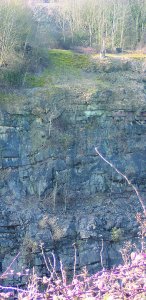|
Geology of Area
The Quarries
Picture Gallery
|
|
 |
| |
Geology of The Ridge  The Ridge Wood, Chipping Sodbury Quarry and Barnhill Quarry are situated on an outcrop of Carboniferous Limestone (circa. 300 million years old). This outcrop forms a long scarp, running from 1km south of Chipping Sodbury and runs to 5 km north of Wickwar. This outcrop was formed during a mountain building period after the rock had been deposited in the Carboniferous era. The folding resulted in a bowl shaped landscape, called a syncline. Younger rocks were then deposited on top and filled this ‘bowl’. These now form the Bristol CoalField. The Ridge Wood is situated on the eastern side of this syncline. The beds of rock can be seen to dip steeply to the west as they disappear into the syncline. The Ridge Wood, Chipping Sodbury Quarry and Barnhill Quarry are situated on an outcrop of Carboniferous Limestone (circa. 300 million years old). This outcrop forms a long scarp, running from 1km south of Chipping Sodbury and runs to 5 km north of Wickwar. This outcrop was formed during a mountain building period after the rock had been deposited in the Carboniferous era. The folding resulted in a bowl shaped landscape, called a syncline. Younger rocks were then deposited on top and filled this ‘bowl’. These now form the Bristol CoalField. The Ridge Wood is situated on the eastern side of this syncline. The beds of rock can be seen to dip steeply to the west as they disappear into the syncline.
This photograph shows the rockface at Barnhill Quarry.
Limestone is a sedimentary rock, deposited in an ocean environment. Many limestones are composed of the calcareous skeletons and shells of various forms of ancient sealife.
In Ridge Wood, limestone can be various colours, from light grey to black and it can even be red if there is hematite in the rock. It is a hard rock and is non-porous, although water can travel through the rock using the cracks and fissures in the formations.
Barnhill Quarry, SSSIBarnhill Quarry is designated a Site of Special Scientific Interest (SSSI) due to the exposed rock stratigraphy. On top of the Carboniferous Limestone is a layer of younger Triassic (circa. 200 million years ago) Rhaetic Clay. There is a large area where the Rhaetic Clay has been removed and the Carboniferous Limestone has been exposed. This area of limestone was eroded by the Triassic Sea into a wave cut platform. On this can be seen limestone pavement features such as karstic grikes. At the base of the Rhaetic section there is a ‘bone bed’, which is a pebble bed containing vertebrae and teeth. Above this is the shale sequences, containing bivalves and fish fossils.
|
|
| |
|